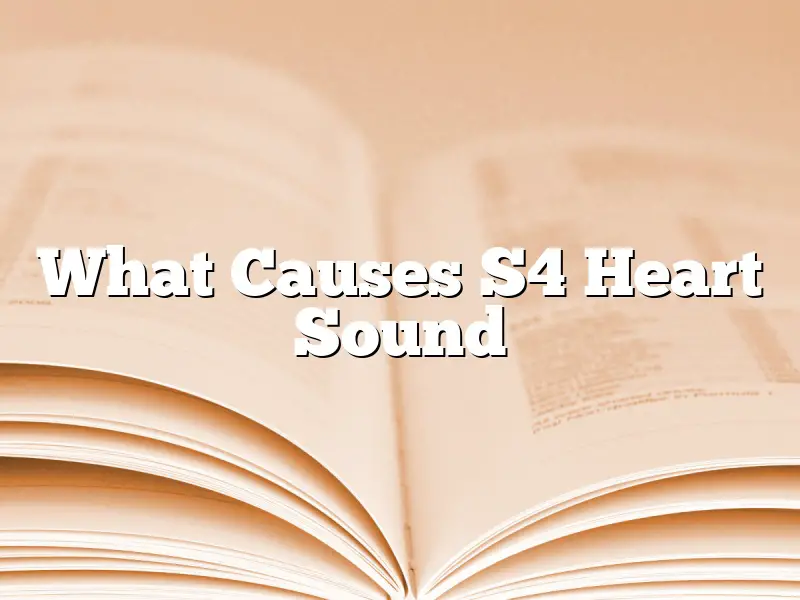What Causes S4 Heart Sound?
The S4 heart sound is caused by the heart’s mitral valve closing. When the valve snaps shut, it creates a sound that can be heard with a stethoscope.
While the cause of the S4 heart sound is well-known, its significance is not always clear. In some cases, the sound may be a sign of a problem with the heart valve. In other cases, it may be nothing to worry about.
The S4 heart sound is caused by the vibration of the mitral valve leaflets as they close. The leaflets are attached to the mitral valve annulus, which is a ring of muscle that surrounds the valve. When the leaflets snap shut, they cause the annulus to vibrate. This vibration creates the S4 heart sound.
The S4 heart sound is usually heard during the late systole, or when the heart is contracting. It may be heard best at the left lower sternal border.
The significance of the S4 heart sound depends on the patient’s age and other medical conditions. In most cases, it is nothing to worry about. However, in some cases, it may be a sign of a problem with the mitral valve.
If you are concerned about the S4 heart sound, talk to your doctor. He or she can evaluate your symptoms and determine if further testing is needed.
Contents
What condition causes S4?
S4 is a heart condition that results when the ventricles in the heart become enlarged. This can happen as a result of a number of different conditions, including heart failure, high blood pressure, and coronary heart disease. When the ventricles become enlarged, they can’t pump blood as effectively as they should, which can lead to a number of problems, including shortness of breath, chest pain, and even heart failure.
What causes S3 and S4 sounds?
S3 and S4 sounds are caused by certain medical conditions. When the heart muscle doesn’t contract as well as it should, it can cause a backflow of blood from the ventricles to the atria. This backflow of blood creates a swishing sound that’s called an S3 sound. An S4 sound is created when the heart muscle contracts too hard and pushes blood from the atria into the ventricles. This sound is a thumping noise that’s heard with a stethoscope.
Is S4 heart sound normal?
The S4 heart sound is a sound that is sometimes heard when listening to someone’s heart. It is caused by the valves in the heart closing.
Some people are worried that the S4 heart sound means that they have a heart problem. However, usually the S4 heart sound is not a sign of a problem. It is usually just a normal variation in heart sound.
If you are concerned about the S4 heart sound, it is best to talk to your doctor. They can listen to your heart and let you know if there is anything to worry about.
Why do you hear S4 in aortic stenosis?
Aortic stenosis is a problem that can occur in the aorta, the large artery that carries blood away from the heart. In aortic stenosis, the opening of the aorta is narrowed, which can make it difficult for the heart to pump blood out to the rest of the body.
One common symptom of aortic stenosis is a change in the tone of the person’s voice. In particular, you may hear an S4 sound when listening to the person’s heart. This sound is caused by the turbulence of blood as it flows through the narrowed aortic opening.
While the S4 sound is a common sign of aortic stenosis, it is not always present. So if you notice any other changes in the person’s voice, such as a hoarse quality or difficulty speaking, be sure to mention it to their doctor.
What does an S4 indicate?
An S4 heart sound indicates a patent ductus arteriosus (PDA), which is a congenital heart defect in which the ductus arteriosus, a blood vessel that normally closes shortly after birth, remains open. This allows extra blood to flow between the aorta and the pulmonary artery, which can overload the heart and lead to heart failure. An S4 heart sound can also be caused by other heart abnormalities, such as aortic stenosis or hypertrophic cardiomyopathy.
Is S4 normal in older adults?
Heartbeat rhythms are classified into four categories: sinus, junctional, atrial, and ventricular. The fourth heart sound (S4) is considered a normal finding in older adults. It is usually caused by increased stiffness of the ventricular walls and can be heard best at the lower left sternal edge.
S4 is a result of the ventricles trying to pump blood out against increased resistance. It is most commonly heard in people with heart failure, but can also be heard in people with normal hearts. The sound is caused by the ventricles contracting just after the atria have finished contracting. This causes the blood to pile up in the ventricles and results in a sound known as S4.
S4 is not usually a cause for concern and does not indicate any underlying heart problems. However, if you are concerned about the sound your heart is making, be sure to speak with your doctor.
When do you hear S4 sound?
Most people hear the S4 sound when they have a heart condition called aortic stenosis. Aortic stenosis is a narrowing of the aorta, which is the large artery that carries blood from your heart to the rest of your body. When the aorta is narrowed, it can’t carry as much blood as it should. This can make your heart work harder to pump blood and can lead to chest pain, shortness of breath, and other problems.


